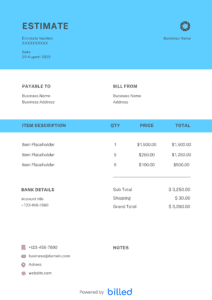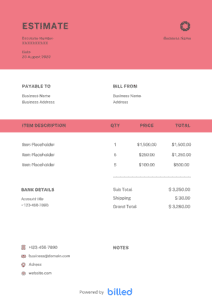Roofing Estimate Template
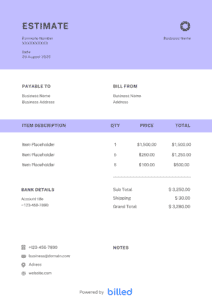
Download our free roofing estimate template today and get an accurate estimate for your roofing project. Our template is easy to use and includes fields for all the necessary information you need to capture when creating a roofing estimate.
Get Your Free Roofing Estimate Template
If you want to gain a competitive edge over other small businesses, you need the best and perfect estimating tool to impress your clients.
Get free roofing estimate templates from Billed. Start creating functional estimates in seconds, build the trust with that potential client to whom you are going to give an estimate.
Our beautiful templates are available in various friendly formats like Google Sheets, Google Docs, PDF, Word, and Excel.
Download Free Roofing Estimate Template
Estimate With Billed
Print, download or send your estimate for free with Billed.
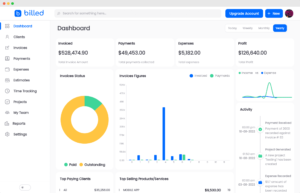
Estimate With Billed
Download the free professionally designed, fully customizable estimate template from Billed.

Roofing Estimate Proposal Template
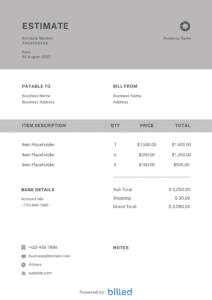
Do you want to get more roofing jobs at better prices more easily? This ready-made roofing estimate proposal template gives you the opportunity to express your value. Download it now, run your business more smoothly and effortlessly.
Download For:
Commercial Roofing Contract Estimate Template
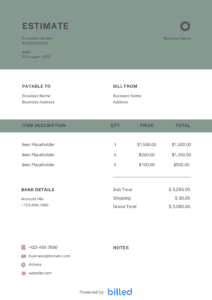
Proper and clear estimates are an absolute requirement for a successful commercial roofing contract. Download this editable and full-fledged commercial roofing estimate template, and start creating complete and impactful estimates with just a few clicks.
Download For:
Estimate With Billed
Create a unique estimate in seconds with Billed and stand out from your competitors.
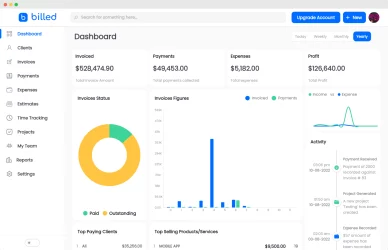
Instantly Estimate any Roof Cost for Free
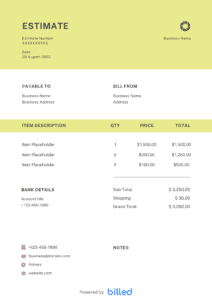
Clarity is a very important point in estimating roof construction. Download the free instantly estimate template and present an accurate estimate for a roofing project. It has all essential features of the job like roofing cost, labor required, materials, and total cost.
Download For:
- What is a Roofing estimate?
- What does this roofing estimate template do?
- How Long Does a Roofing Estimate Take?
- Why Use Our Roofing Estimate Templates?
- How do I estimate roofing costs?
- What Should Be Covered in a Roofing Estimate?
- Tips While making an Estimate
- How to make a Roofing Estimate?
- Some Other Templates
- Download The Roofing Estimate Template For Free
What is a Roofing estimate?
A roofing estimate is a document that assesses the costs and scope of a roofing project. It outlines the materials, labor, and services required to complete the roofing job. The estimate helps roofing contractors and clients understand the expected expenses and the extent of work needed for the project.
What does this roofing estimate template do?
Our roofing estimate template serves as a tool to help roofing contractors or professionals provide detailed cost estimates for roofing projects. It helps them outline the scope of work, materials required, labor costs, and other relevant information necessary for the estimation process.
Our beautiful and customizable templates streamline the process of creating accurate and professional estimates by providing a structured format and organized sections.
Our templates ensure that all essential aspects of the roofing project are considered, enabling contractors to provide clients with a clear breakdown of costs and specifications. Ultimately, the roofing estimate template facilitates effective communication between the contractor and the client, promoting transparency and informed decision-making.
How Long Does a Roofing Estimate Take?
The duration of a roofing estimate can vary, typically taking approximately 3-10 business days to complete. However, the specific timeframe depends on several factors, such as the project’s complexity, the availability of information, the extent of site assessment required, and the workload of the roofing contractor. It is essential to allow sufficient time for a thorough evaluation and accurate estimation to ensure the client receives a comprehensive and reliable proposal.
Why Use Our Roofing Estimate Templates?
Using a roofing estimate template from Billed offers several advantages for roofing contractors or professionals. Here are some key reasons to utilize a roofing estimate template:
Efficiency and Time-saving:
A roofing estimate template provides a structured format with pre-defined sections and categories. It streamlines the estimation process by eliminating the need to create estimates from scratch each time. Contractors can fill in the necessary details, saving time and effort.
Consistency and Professionalism:
A template ensures consistency in the format and presentation of estimates. This consistency reflects positively on the contractor’s brand and instills client confidence. It helps maintain a professional image by providing a standardized layout, clear headings, and organized information.
Comprehensive Documentation:
A well-designed roofing estimate template prompts contractors to include all essential details. This ensures no crucial information is overlooked, providing clients with a comprehensive breakdown of costs, materials, and project specifications.
Accuracy in Cost Calculation:
The template typically includes sections for labor costs, material costs, additional expenses, and tax calculations. It helps contractors accurately calculate and document the various cost elements, minimizing the chances of errors or omissions.
Customization and Branding:
Many roofing estimate templates allow for customization, allowing contractors to incorporate their company logo, branding elements, and contact information. This gives a professional touch and reinforces brand identity throughout the estimate.
Time Management and Organization:
By using a roofing estimate template, contractors can efficiently manage their estimation process. The template acts as a reference point, ensuring that all necessary information is gathered and documented in an organized manner. It also allows contractors to track and manage multiple estimates simultaneously easily.
How do I estimate roofing costs?
Estimating roofing costs requires careful consideration of various factors. Here’s a step-by-step guide to help you estimate roofing costs:
Assess the Roof Size:
Measure the dimensions of the roof to determine its square footage. This involves measuring the length and width of each section and calculating the total area.
Evaluate the Roofing Material:
Determine the roofing material you plan to use, such as asphalt shingles, metal, tile, or slate. Consider the material’s quality and durability, which can affect the overall cost. Research the price per square foot or bundle for the chosen material.
Consider Roof Complexity:
Assess the complexity of the roof design, including its shape, slopes, and architectural features. A complex roof may require additional labor and materials, impacting the overall cost.
Account for Old Roof Removal:
If the project involves removing the existing roof before installing the new one, consider the cost of removing or disposing of the wasted materials. This cost can vary depending on the roofing material and the complexity of the removal process.
Factor in Additional Materials and Accessories:
Consider other necessary materials and accessories, such as underlayment, flashing, vents, and gutters. Research the prices of these components and add them to the estimate.
Consider Labor Costs:
Labor costs are a significant component of roofing estimates. Research the prevailing rates for roofing contractors in your area. Take into consideration the project’s complexity, the installation time, and the contractors’ experience level.
Include Permits and Inspections:
Check if your local jurisdiction requires permits for roofing projects and account for the associated costs. Additionally, consider any required inspections and their fees.
Account for Contingencies:
Including a contingency amount in the estimate is wise to cover any unforeseen expenses or changes during the project.
Calculate Taxes and Overhead:
Consider applicable taxes, such as sales tax, that may apply to materials and labor costs. Additionally, account for overhead expenses, such as insurance, equipment, and administrative costs.
Prepare a Detailed Estimate:
Compile all the information gathered and create a detailed estimate. Include a breakdown of costs, material quantities, labor hours, and other relevant information.
What Should Be Covered in a Roofing Estimate?
When creating an estimate, it is essential to include the following key details:
Your Company Information: Start the estimate by adding your company’s name, logo, address, contact details, and any relevant licenses or certifications.
Client’s Details: Add the client’s name, address, phone number, and email address.
Estimate Number: Include a unique estimate number to track and reference the estimate easily. This number serves as a reference for both you and the client.
Payment Due Dates and Methods: Add the payment terms, including the due dates for each payment installment and the acceptable payment methods like cash, check, credit card, or online payment platforms.
Approximated Project Timeline: Include the estimated timeline for the project, indicating the start date and expected completion date. This helps the client get an idea of the project’s duration.
Estimated Cost of Old Roof Removal: If the project involves removing the old roof, include the estimated cost. This enables the client to understand the breakdown of expenses.
Roof Estimate Materials: List the materials required for the roofing project, including the type of roofing material, quantities, and associated costs. This gives the client an overview of the materials to be used.
Full Description of Work: Add a detailed description of the work to be performed, specifying the scope of the project, such as roof installation, repairs, or replacements. Be clear about the specific tasks involved.
Guarantees and Expectations of Work: Add any guarantees or warranties your company provides for the work performed. Specify the expected quality standards and any additional services included in the estimate.
Warranty and Provisions: Add the warranty period for the roofing work and any provisions related to warranty claims or maintenance services. This assures the client of the longevity and reliability of the roofing project.
Tips While Making an Estimate
When creating a roofing estimate, accuracy and thoroughness are vital to ensure a successful roofing project and client satisfaction. Here are some valuable tips to keep in mind:
Roof Inspection: Begin with a comprehensive roof inspection to assess the existing roof’s condition, identify any issues or damage, and determine the scope of work required.
Detailed Measurements: Take accurate measurements of the roof’s dimensions, slopes, and unique features to calculate the correct quantity of materials needed.
Material Selection: Choose roofing materials that suit the client’s preferences, budget, and the project’s specific requirements. Consider factors like durability, aesthetics, and energy efficiency.
Labor Evaluation: Estimate the labor costs based on the roofing project’s complexity, the crew’s required size, and the work’s expected duration.
Breakdown of Costs: Provide a detailed breakdown of all costs, including materials, labor, permits, equipment rental, and any additional services, to give the client a clear understanding of the estimate.
Consider Waste Disposal: Account for waste disposal costs if old roofing materials need to be removed and disposed of properly.
Factor in Contingency: Allow for a contingency amount in the estimate (usually around 10-20% of the total cost) to cover unforeseen issues or changes during the project.
Local Regulations: Be aware of local building codes and regulations that may impact the roofing project, such as permit fees and specific material requirements.
Provide Multiple Options: Offer various roofing solutions and materials at different price points, providing clients with choices that suit their needs and budget.
Clear Communication: Clearly communicate any warranty information, project timeline, and terms and conditions related to the roofing work.
Transparent Pricing: Avoid hidden fees or ambiguous costs in the estimate. Ensure that the pricing is straightforward and easily understandable for the client.
Professional Presentation: Present the estimate in a well-organized and professional manner, using a clear format and easy-to-read fonts.
Review with the Client: Review the estimate with the client in person or over the phone, explaining the details and answering any questions they may have.
Follow-Up: After providing the estimate, follow up with the client to address any concerns and provide additional information if needed.
By following these tips, you can create a comprehensive and accurate roofing estimate that helps build trust with your clients and sets the stage for a successful roofing project.
How to make a Roofing Estimate?
Creating a detailed and professional-looking roofing estimate has become much easier with Billed. You need to follow these simple steps:
Download the free Roofing Estimate Template from Billed: Begin by accessing the Roofing Estimate Template provided by Billed. It serves as a convenient starting point for your estimate.
Add Your Company’s Details: Personalize the estimate by including your company’s information. Insert your company name, contact number, email address, and any other relevant details.
Add Your Customer’s Details: Input your customer’s details below your company’s information. Include their name, address, and contact information to ensure the estimate is specifically tailored to them.
Describe the Roofing Work: Provide a clear and concise description of the roofing work to be done. Specify the type of roofing services required, such as repair, replacement, or installation.
Quantity and Specifications: If applicable, include the quantity and specifications of roofing materials needed for the project. This could involve specifying the type and dimensions of roofing shingles or other materials.
Labor Costs: Estimate the labor costs required for the roofing project based on the complexity of the work and the expected duration.
Additional Costs: Account for any additional expenses related to the roofing project, such as permits, disposal fees, or other necessary services.
Total Estimate: Calculate the total cost of the roofing project by adding up all the individual costs listed in the estimate.
Terms and Conditions: Include any specific terms and conditions related to the roofing work, such as payment schedules or warranties, in the estimate.
Save and Share: After filling in all the required details, save the roofing estimate as a professional-looking document, and share it with your customer through email or other preferred communication channels.
By following these steps and utilizing Billed’s Roofing Estimate Template, you can create a well-structured and personalized roofing estimate that helps you effectively communicate the details and costs of your roofing services.
Download The Roofing Estimate Template For Free
By downloading the free roofing estimate template from Billed Right, get the job done. This template is designed to help contractors quickly manage the process, from estimating costs and tracking expenses to preparing professional estimates. Get your free download now!


